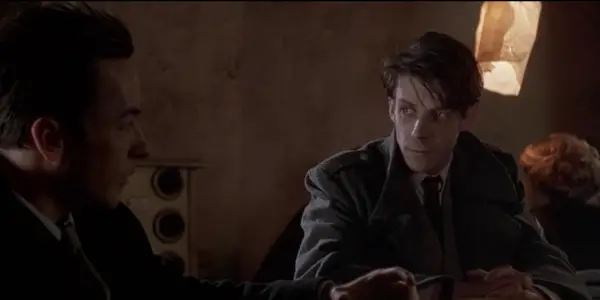Few movies stir up as much controversy at the time of their release as did Max, written and directed by Menno Meyjes. In the movie, John Cusack plays art dealer Max Rothman, whose own confidence in creating art was hampered after losing an arm in the first World War.
But while the movie is ultimately Max’s story, the controversy stemmed from how the script handled its main supporting character – a young Adolf Hitler, played by Noah Taylor.
What’s so wrong with a movie that includes Hitler? After all, it’s been done many times before and many times since. The short story is that Max caused a stir because it didn’t portray Hitler as evil. Unbearable, abhorrent, pathetic; you could call Taylor’s version any of those –but not evil.
Two things should be made clear. First, that Max doesn’t claim any historical accuracy, and it certainly isn’t anyone’s biography. Second, that the film doesn’t imply, much less attempt to show, that Hitler wasn’t the evil, genocidal tyrant that history knows him as today. It simply imagines a time in his life prior to that path being trodden, and the possibilities that could have existed.
Max Defies Genre
Like many of the best movies, it’s hard to place Max into a category. It’s a historical fiction drama with script elements of black comedy and a set that often feels more like it belongs to a horror flick. At any rate, calling it a “World War II movie” would be a giant leap. Yet, put up against the heart-pounding tension of Saving Private Ryan, the masterful tear-jerking of Schindler’s List, and every other great story set against the backdrop of the WWII era, Max stands out as one of the most chilling, uncomfortable, and creepy of all.

Cusack himself, who also produced the film (without taking a salary), explained the reason for this when he gave an interview shortly after the release:
“That’s not a truth we would like to face, that Hitler is one of us,” says Cusack. “But that person tapped into parts of our unconscious. I mean, people followed him, and unfortunately, that’s not up to debate. Unfortunately, the guy wasn’t a monster that came down from Pluto with pink vapors and lightning bolts and then left in a cloud of dust, he was a human being. And he has human characteristics and human sets of desires that we can relate to just like we can relate to some of the higher aspects of his character.”
For all the elements of Taylor’s Hitler that are unlikeable, there are still a few that elicit some amount of sympathy – even empathy. Regardless of whether the real Hitler was sympathetic for the same reasons, Cusack is right; as a human being, he would have undoubtedly been relatable in some way.
The Scariest Part
The idea that anyone could be monstrous is worth pondering. It may be true that each and every person is, in the right circumstances, capable of more anger and more destruction than they can imagine. Max isn’t quite so shallow in what it offers, though. On a deeper level, it encourages viewers to identify not with Adolf Hitler, but with Max Rothman.
In the movie, the two become acquaintances who take tentative steps toward friendship. It’s a dark, twisted “buddy picture” in which Max embodies a mentor’s role in Hitler’s budding artistic career. Unfortunately, Max fails to see that his own influence is pushing Hitler further toward the extremes of belief and desire, ironically helping create an evil force that probably would have consumed Max himself in the succeeding years.
While it would be ridiculous to imagine that one person or circumstance made Hitler into who he was (and yes, in some ways, Max is a ridiculous film), there’s a penetrating metaphor at work within the narrative. We may not be – or befriend – the next Hitler, but when we are locked into our own ambitions and perspective, what undesirable conditions do we allow to grow up around us? In the same way that Max tolerates Hitler’s bigotry and disagreeableness because he believes they serve a higher purpose, it’s possible that we all foster degrees of evil and oppression simply by tolerating them.
In the end, the movie, like this review, can offer no answers. But that’s what great film does – it explores, not explains, even when the subject matter makes us cringe.
What do you think about Max’s “humanization” of Hitler? Is it more important to remember him only in the context of the atrocities he committed, or is there value in exploring his life holistically?
Does content like this matter to you?
Become a Member and support film journalism. Unlock access to all of Film Inquiry`s great articles. Join a community of like-minded readers who are passionate about cinema - get access to our private members Network, give back to independent filmmakers, and more.